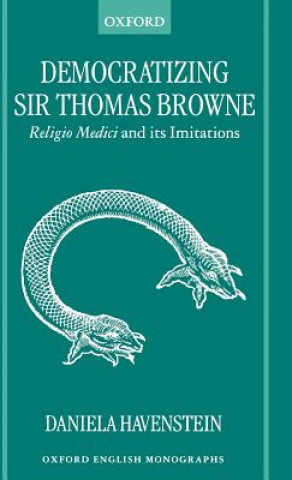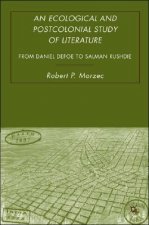
Doručení
Nákupní rádce





Nehodí se? Vůbec nevadí! U nás můžete do 30 dní vrátit
 Dárkový poukaz
V libovolné hodnotě
Dárkový poukaz
V libovolné hodnotě
S dárkovým poukazem nešlápnete vedle. Obdarovaný si za dárkový poukaz může vybrat cokoliv z naší nabídky.
Democratizing Sir Thomas Browne
 Angličtina
Angličtina
 291 b
291 b
30 dní na vrácení zboží
Mohlo by vás také zajímat


Criticism on Sir Thomas Browne is at present in a state of limbo. Little or no attention is paid to his once famous style, while his political attitudes have increasingly jarred with current trends in literary criticism. Democratizing Sir Thomas Browne offers a reconsideration both of Religio Medici's style and of its early reception history, especially as witnessed by a group of late-seventeenth and early eighteenth-century texts that can loosely be described as 'imitations'. The first part of the book focuses on this hitherto neglected aspect of the reception of Religio Medici, establishing and then analysing examples of imitation, plagiarism, and animadversion, with particular reference to three books which are outstanding in this respect: Sir George Mackenzie's Religio Stoici(1663), John Dunton and Benjamin Bridgwater's Religio Bibliopolae (1691), and Richard Burridge's Religio Libertini (1712). The many and complex responses to Browne's Religio Medici bear witness to the book's centrality in the period: examination of these responses permits a more differentiated assessment of the work itself, and a deeper understanding of seventeenth- and early eighteenth-century mentalities. The second part of the book attempts to create a new context for the study of seventeenth-century prose by re-examining Morris W. Croll's analysis of Browne's idiom in Religio Medici employing quantitative techniques, the use of which is itself subjected to analysis. Particular attention is paid to word-classes, word-patterns, and lexis. The results of this quantitative investigation are then used as the parameters for comparing the work's three major 'imitations'. To embed this study into a broader seventeenth-century framework, a group of control writers is also examined: John Donne, Jeremy Taylor, and Richard Baker. Freeing Browne from the corset of previous stylistic criticism, will, it is hoped, pave the way for a reconsideration of his style and that of seventeenth-century prose more generally.
Informace o knize
 Angličtina
Angličtina




 Jak nakupovat
Jak nakupovat






















